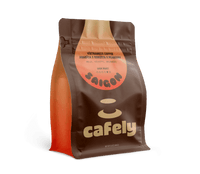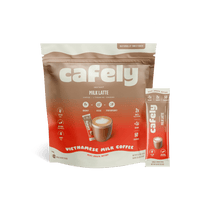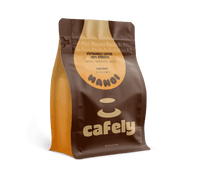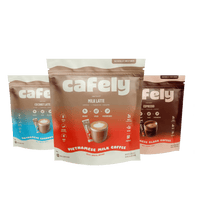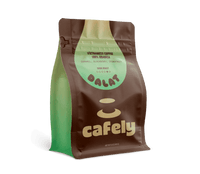Coffee makes the perfect pick-me-up, the lifeblood of mornings, meetings, and late-night creative bursts. But for all the perks, one drawback is hard to ignore: those stubborn stains it can leave behind on your teeth.
Preventing those dreaded coffee stains isn’t as complicated as it sounds. We dug into the science and put together the most effective ways to stop them. We’ll explain why the stains happen and provide some tips for avoiding them.
How to Prevent Coffee Stains on Teeth
We’ll get to what causes coffee stains on teeth, but first, let’s look at a few things you can do to prevent them.
1. Adjust Your Coffee Drinking Habits
The first solution is the simplest, but it’s also one that we don’t want to hear: stop drinking coffee.
Of course, for most of us, ending our coffee ritual is unacceptable. Beyond the fact that it gives us the caffeine rush, it’s something we love too much to give up. So, aside from quitting, how can you prevent those coffee stains from forming?
One tip is to drink your coffee in one sitting rather than take small sips all day.
If you do this, your teeth only have to deal with the bacteria and tannins in coffee once rather than repeatedly.
It’s similar to dyeing fabric — one dip in dye is unlikely to do much. Several dips, however, can change the fabric’s color.
2. Avoid Adding Cream & Sugar
Creamer and sugar are common coffee additives that speed up the growth of bacteria in your mouth, which compounds your teeth discoloration. Coffee can cause some bacteria to develop in your mouth, just like any drink that’s not plain water. Cutting creamer and sugar from your coffee is a healthy choice for your teeth and body.
3. Drink Water or Brush Your Teeth After Coffee

Another tip? Drink water after your cup of coffee. This helps in a very simple way: it rinses your mouth out. While it’s not as effective as brushing your teeth or using mouthwash, it can be a great way to reduce the volume of tannins on your teeth.
Brushing your teeth and using mouthwash is the best course of action to reduce the tannins and bacteria as much as possible.
However, wait 30 minutes to an hour before doing these. The acid temporarily weakens your enamel, so brushing immediately after may cause more damage. Your saliva will naturally neutralize the acidity, so waiting to brush is a smart move.
4. Use a Straw
It can also help to drink coffee through a straw, though this is likely easiest if you prefer iced coffee.
Drinking through a straw makes the liquid bypass your front teeth and go straight into your mouth.
Of course, your back teeth may still get stained, and any coffee residue in your mouth may also stain your other teeth with time. This isn’t a perfect solution, but it can help a little.
Undoing Coffee Stains on Teeth
The most effective way to reverse discoloration is through professional dental cleanings. Your dentist has tools that can break down surface stains far better than a regular toothbrush, and most stains can be reduced during a routine visit.
For at-home care, whitening toothpastes can help, but not all are created equal. Stick to products approved by the American Dental Association (ADA) to ensure they’re both safe and effective.
You can also try gentle home remedies. A common one: brushing with baking soda. Just wet your toothbrush, dip it in baking soda, and gently brush. The fine crystals act as a mild abrasive to lift surface stains.
Important: Use baking soda, not baking powder. Baking powder contains acidic ingredients that can erode enamel over time.
What Causes Coffee Stains on Teeth?
Coffee contains many different compounds that give it its delicious flavors. However, two of the drink’s properties can lead to teeth staining: acid and tannins.
Tannins
Tannins are a natural substance found in things like coffee, tea, and wine. They’re responsible for the drying sensation these drinks sometimes make you feel.
Because they’re soluble in water, tannins often dissolve out of your coffee beans and into your morning cup. In turn, they get into your mouth and can stick to your teeth. This can lead to a yellowing of teeth over time, even if you have as little as one cup of coffee daily!
Thankfully, this staining tends to be surface-level, so good oral hygiene can help keep on top of it.
Acid & Bacteria Growth
Coffee’s acidity can also impact your teeth. In fact, all acidic foods and drinks weaken tooth enamel, slightly thinning out this important protective layer. Enamel is the white external layer of your teeth. Underneath that is a substance called dentin, which is slightly yellow. The dentin can make your teeth appear discolored as your enamel wears away.
On top of this, coffee can also lead to bacteria growing in your mouth, weakening enamel over time. Sugar compounds this bacteria growth, so having a sweet coffee drink first thing in the morning can harm your teeth.
What Other Food Can Cause Stains on Teeth?
Keeping your teeth pearly white isn’t exclusively about coffee. There are lots of different foods and drinks that can cause stains.
Of course, the two big players are still tannins and acids. This is true no matter where they’re found, including black tea or red wine. Both of those drinks are high in tannins, which leads to the astringent flavor they share.
Highly acidic foods and drinks without tannins are also cause for concern. Fruit like berries or tomatoes can be a problem for your teeth, as can cola and other sodas. These things are all pretty acidic, and that can lead to teeth discoloration.
How to Pick the Best Coffee to Avoid Stains on Your Teeth

Acidity and tannins are the core causes of teeth discoloration. So, to find a coffee that doesn’t cause many stains, we should look for a coffee that is low in those properties.
1. Light, Medium, or Dark Roasts
When selecting a coffee that won’t stain your teeth, look for beans with the least acidity and tannins. Both compounds are found in higher proportions in the green beans and generally decrease as the beans are roasted.
So, dark roasts are the best coffees to avoid staining on your teeth. To find the tastiest dark roasts, look for interesting and unique blends — adding some robusta beans to a bag of arabica can bring delicious flavors to the fore.
2. Robusta or Arabica
When choosing between these bean types, there’s a trade-off at play. On the one hand, the bright and fruitier notes of arabica beans mean they have more natural acids, while robusta beans tend to have more tannins. Both of these compounds can lead to staining on your teeth.
However, darker roasts have had more of their acid and tannin content removed during roasting. While it is a matter of personal taste, robusta beans are at their best when roasted dark and arabica can be roasted a little lighter for a more nuanced flavor. Therefore, a stellar choice would be a dark roast robusta.
3. Bean Growth Location
Where the beans are grown can impact their tannin content and acidity. The science behind tannin content and geographic location is inconclusive, but we know how location impacts acidity.
A good rule of thumb is that coffee grown at higher elevations can have a higher acidity in the final cup. If you want to avoid acidity for your dental health, you might be best served by a coffee grown at low elevations.
While the Vietnamese highlands have long been regarded as the starting spot of some amazing coffee beans, coffee grown at lower elevations in Vietnam is also excellent. Robusta beans tend to be grown at lower elevations than arabica beans, which contributes to them often having lower acidity. This is another reason they’re great for those looking to avoid coffee stains on their teeth.
4. Choose Quality Products
When purchasing coffee beans, always opt for quality wherever possible. Every single boost in quality leads to a boost in what you’re drinking every day.
- Organic — Healthy coffee made without human-made pesticides and herbicides can grow much more slowly, imparting more flavor to the beans.
- Mold-free — Some crops can experience mold growth when shipped internationally or stored for a long time. By selecting certified mold-free coffee, you get no mycotoxins in your morning brew.
- Fairtrade — The Fairtrade agreement certifies that the farmers are paid a fair rate for their produce. As such, it allows them to take their time so the coffee is perfect, rather than rushing to get the beans to market.
- Fresh — Coffee is at its most flavorsome around 24 hours after it’s been roasted. To get the most flavor, buy coffee that’s been roasted within the last two weeks. After that point, the beans will begin to taste stale and unpleasant.
- No added sugar — Roasters sometimes add sugar to subpar beans to mask bad flavors. Buying coffee beans with no added sugar helps ensure you’re selecting the beans with the best natural flavor.
FAQs: How to Prevent Coffee Stains on Teeth
Preventing coffee stains on teeth is ideal, so let’s discuss some FAQs to learn how best to keep a handle on it.
1. How Do You Stop Coffee from Staining Your Teeth?
A good way to do this is to drink your coffee through a straw. This reduces the amount of acid and tannins your teeth come into contact with, leading to a reduced risk of discoloration over time.
2. How Do You Keep Your Teeth White if You Drink a Lot of Coffee?
Oral hygiene is paramount for maintaining white teeth while you drink coffee. After you have coffee, follow it with a glass of water. This will rinse the remaining coffee out of your mouth and reduce staining. Even better, consider brushing your teeth or using mouthwash, as this can significantly reduce the acid and bacteria in your mouth.
3. How Can I Safeguard My Teeth from Black Coffee?
Teeth discoloration can result from several things, most notably tannins, acid in coffee, and bacteria on your teeth. Swapping to black coffee can reduce the speed at which the bacteria work, leading to less discoloration. To help yourself even more, consider brushing your teeth after coffee to remove tannins before they stain.
4. Will One Coffee a Day Stain Teeth?
Yes, as little as one cup of coffee per day can stain teeth. The staining will intensify in those who drink a lot of coffee, but even just one cup contains tannins and acid that can lead to discoloration.
5. How Can I Get Caffeine Without Staining My Teeth?
Preventing stains on your teeth is all about removing tannins, acid, and bacteria from them. You can do this by brushing your teeth after everything you eat or drink (other than water) or using mouthwash. Alternatively, using a straw when drinking prevents the offending compounds from getting to your teeth.
6. Does Clear Coffee Exist?
Yes, it does. One startup uses a method to create a beverage that's entirely clear but still has a distinct coffee flavor. However, the company is very secretive about its proprietary method, which makes some people a little wary. Personally, we're not sure if we'd enjoy clear coffee — some of the joy a cup brings is the rich color in your mug. Besides, the brown color of coffee isn't why your teeth turn yellow.
7. Are Coffee Stains on Teeth Permanent?
Generally, coffee stains can be removed. The most intense coffee stains are caused by tannins, which stick to the surface of your teeth and lead to a slightly yellow color. These tannins, thankfully, can be removed through regular professional cleaning or whitening products.
8. Can a Dentist Tell If You Drink Coffee?
Yes, dentists can tell if you’re a coffee drinker. Through the combined action of tannins, acid, and sugars, coffee can lead to discoloration of your teeth. It can also cling to the tongue, leading to bad breath. If you’ve had a cup just before your appointment, your dentist may be able to smell it.
9. What Is the Best Toothpaste to Prevent Coffee Stains?
The best whitening toothpastes to remove coffee stains usually contain baking soda. Baking soda works as a very gentle abrasive and scrubs away the stains on the teeth' surface. To make sure you're safe, only use whitening products that have been approved by the dental authority in your country.
10. How to Restore Tooth Enamel?
Unfortunately, tooth enamel doesn’t grow back. However, you can boost the enamel that’s still on your teeth with remineralization. This process binds fluoride, calcium, and other minerals with the enamel and is one of the main reasons toothpaste, mouthwash, and tap water usually contain fluoride.
